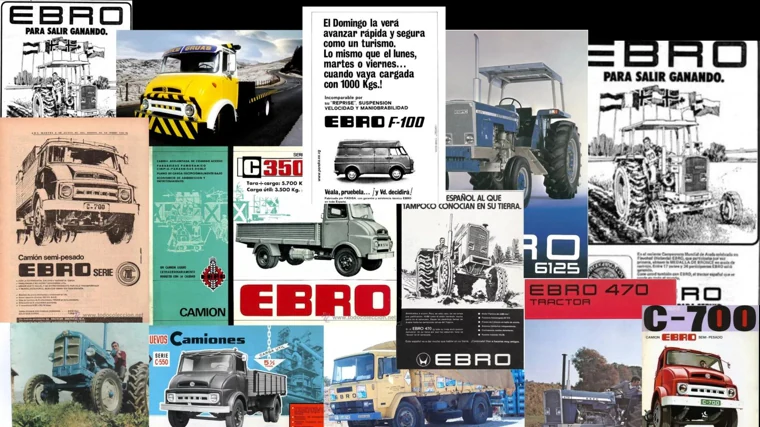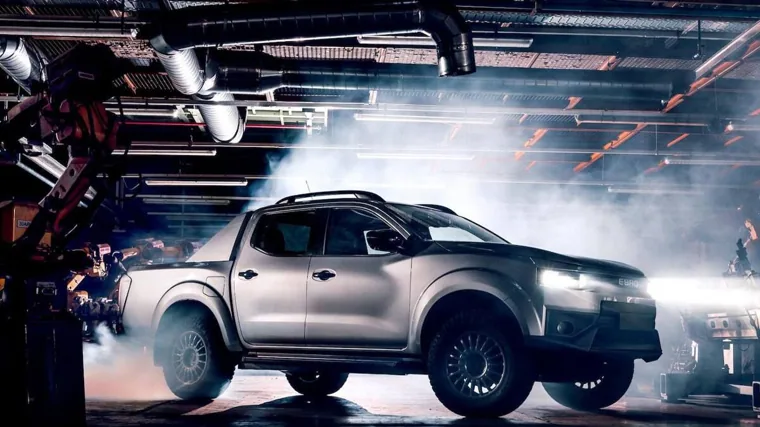The 2023 Automobile Barcelona witnessed the resurgence of EBRO. The legendary brand of industrial and agricultural vehicles, which will soon celebrate the 70th anniversary of its founding (1954), returns to manufacturing cars thanks to the creation of a joint venture with majority participation of EBRO and the Chinese Chery to produce Omoda and EBRO vehicles in the Free Zone. The EBRO firm operated in Spain until 1987, so after 37 years it returns to the roads.
A 100% electric Pick-up, scheduled for the fourth quarter of 2024, will be the first of the vehicles with which it will be possible to celebrate the return to activity as a car factory of the former Nissan facilities, and at the same time, of the resurgence of the brand.
It will be the first vehicle that EBRO produces in series at the D-Hub factory in Zona Franca (Barcelona) and represents a novelty in the automotive sector in Europe.
The Zona Franca facilities are heirs of the plant inaugurated by Ford in Cádiz in 1919, which would move to Barcelona in 1923. Nationalized after the Civil War, it passed into the hands of Motor Ibérica, which in 1976 moved production from Avenida Icaria to its current location.
Ebro C-150 from 1966
FP
In 1977 Motor Ibérica had 11,000 employees in 20 factories spread across 13 Spanish provinces, but in 1979 Nissan bought the shares of Massey Ferguson and began manufacturing the Nissan Patrol and Vanette.
The history of the Nissan brand in Spain begins in 1980, when the company acquired a stake in the company Motor Ibérica SA, which became NMISA shortly after. The first vehicle manufactured was the Nissan Patrol, in 1983.
As for the brand's models for sale in Spain, in the mid-eighties the incorporation into the European Common Market caused the liberalization of the automobile market in Spain, which Nissan took advantage of to import its English products, such as the Nissan Bluebird. or the Sunny.
Ten years later, production at the Barcelona plant increased significantly with the launch of the Terrano II all-terrain vehicle for the European market, a model that accounted for 15% of the plant's total manufacturing until 1999. At the end of its commercial life, almost a quarter of a million units of the Terrano II were manufactured in Spain.

History of Ebro trucks and vans
FP
The strategic importance of the Barcelona plant was revealed in 1997, when a division of the NTC-E Technical Center was established there with the precise task of developing new diesel engines, taking into account the increase in demand in Europe for this type of engine. mechanical.
Until 1983, Nissan had manufactured about 3 million vehicles in Spain with production peaking in 2007, when the Barcelona plant manufactured almost 193,000 vehicles, to which were added the 30,000 produced in Ávila.
The global crisis affected production in 2008 and 2009. On November 11, 2008, the company presented an employment regulation file that affected 1,680 workers at the plants in the Free Zone of Barcelona and Montcada i Reixac.
The recovery came in 2010 and until the end of September 2011, with vehicle manufacturing rising to 105,000 units. Renault Alaskan and Nissan Navara were among the last to be manufactured in the Barcelona Free Trade Zone.
Before the announcement of the closure of the Barcelona plant, in January 2020, clear indications of the uncertain future of these facilities were already given. Mercedes Benz announced that starting in May it would stop manufacturing the X-Class pick-up van, which would reduce the workload at the Barcelona factory.
In recent years, production volume had been lost, reaching 55,000 vehicles manufactured in 2019. Also in January 2020, the manufacture of the combustion models of the NV200 van was lost, which have been replaced by a new model, the NV250. , whose manufacturing has been awarded to a Renault plant in France. Already in 2018 this factory had lost the manufacture of the Pulsar model, after its limited commercial history.

Ebro Pick Up
FP
Return to the future
EBRO Pick-Up, which prefigures the brand's first 100% electric series vehicle, will initially be intended for the professional and industrial sector.
The model can circulate in rear-wheel drive or with all-wheel drive through two electric motors that develop 220 kW (299 HP), powered by a 100 kWh lithium-ion battery, with a range of up to 440 kilometers.
Its dimensions (5,218 mm high, 1,848 mm wide and 1,785 mm high) allow it to offer ample interior space to accommodate five people, as well as a practical loading platform that meets the needs of work both in the field like in the city.
#Ebro #iconic #Spanish #brand #manufacturing #Barcelona #years #truth